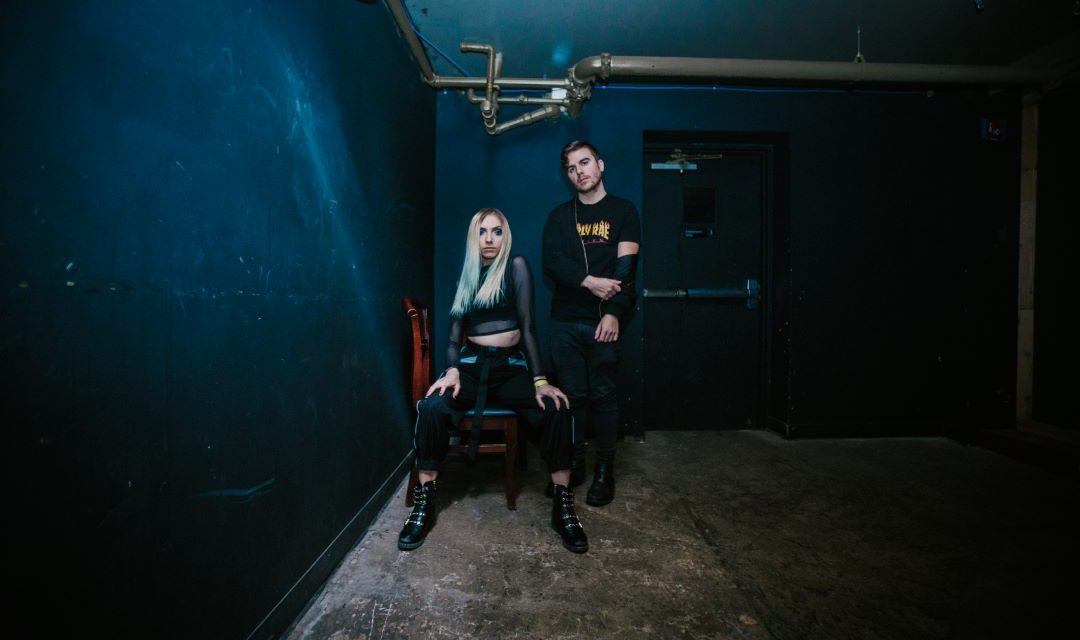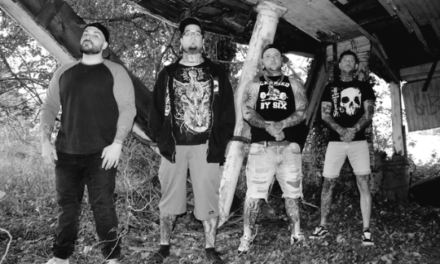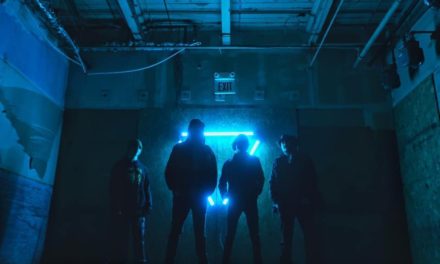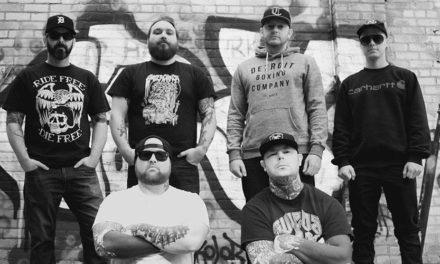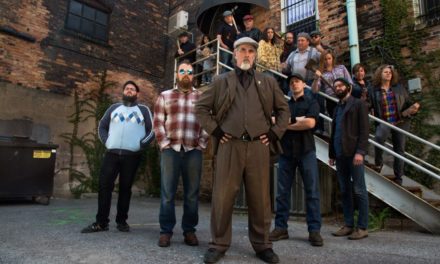The electronically-tinged alternative rock band VISTA released their new single “Eat (I Must)” in March 2019. The song narrates the inner turmoil and guilt felt by lead vocalist Hope Vista throughout her personal struggles with both body dysmorphia and an eating disorder. With “Eat (I Must)”, VISTA’s signature dark, synth-laden rock sound is still present, but lyrically, the band approaches the haunting track with the goal of sparking a larger conversation about the danger of eating disorders and cultivating a safe, open forum for listeners to discuss their experiences. You can catch VISTA on the “On The Hunt Tour: Part II” this April.
Based in New York, VISTA originally formed in late 2015. Comprised of Hope Vista (lead vocals) and Greg Almeida (guitar), the band combines both modern alternative rock and electronic influences to create their unique sound. They released their debut EP ‘VERSUS’ shortly after their original inception, and their debut single “On The Brink” debuted worldwide on idobi radio. The band has garnered praise from outlets such as Alternative Press, Rock Sound, Substream, and AXS. In 2017, VISTA supported Fueled By Ramen artist Against The Current at Irving Plaza, gained idobi rotation with their single “Henchmen”, and completed two headlining US tours to support their 2017 sophomore EP ‘Long Live’. In 2018, VISTA released their singles “Witch Hunt” and “Born For Blood”, completed their third US tour, and played multiple support dates with Set It Off (Fearless Records).
Q: Hope, I know “Eat (I Must)” is a really personal song for you. What made you want to tell your story publicly in this single?
Hope: I have always felt a lot of guilt and embarrassment over what I put my body through when I was 16-18 years old; I’ve felt ashamed that I put my health at risk. Those feelings of guilt have sat there for 8 years or so. As much as I’ve tried to sift through them, I haven’t been able to completely. I wanted the chance to put those feelings of shame to music; this topic isn’t something I’ve openly discussed in my lyrics, and I felt it would be cathartic to finally do so. It wasn’t so much about making it public – writing this song was rooted in creating a piece of music that confronted the internal guilt I’ve felt for so long about what I did to my body.
Q: Did writing this song help you? If so, how?
Hope: It’s definitely helped me understand those guilty thoughts a bit more. I’m 25 years old now, and I struggled with anorexia and body dysmorphia throughout my junior and senior years of high school. No matter how far away I’ve moved from those days, the feelings still lingered. I know I was doing something wrong. I know I was harming myself; not intentionally, but I still was. I needed to put those feelings into lyrics and melody to make sense of it just a bit more. I feel a lot more free, and I also feel a bit less ashamed.
Q: In the song you say “I know I must try to put up a fight”. Is that something you have repeated to yourself throughout your struggles, or what is the story behind that line?
Hope: It’s something I still repeat to myself daily. Although this is something I first began to experience back in 2010, I still struggle with body dysmorphia every day. There are days I physically cannot look in a mirror; it feeds me back an image that doesn’t reflect reality. That’s always been something I’ve struggled to explain. I look in a mirror and I physically see something different than what is actually being reflected. I’ve broken mirrors. I’ve ripped them off the walls. Seeing something different than reality is terrifying, especially when others are telling you that the reflection you are seeing isn’t what’s real. For almost 9 years, I have tried to put up a fight against this false reality that I see, against the voice of an eating disorder that sits in the back of my brain telling me that my weight equates to my worth. That lyric is very important to me and it sits at the end of the chorus of this song to remind myself that I am still here, and I’m still going to fight it.
Q: I cannot help but notice the power within the music of this single. Is there meaning behind that? If so, will you explain?
Hope: That’s something that Greg and I intentionally created together. He really went out of his own internal box with this track, and I’m so proud of him for the work he put in to this.
Greg: Thanks Hope! So yeah, it’s been a crazy ride these past few months cooking up new music for VISTA, and this track was definitely sort of an experiment of how far I could push our sonic palette. In the end I was pleasantly surprised with how the simplicity can still come across powerful. Usually for me personally that’s not always the case but it depends. Sometimes it’s just that right chord, that right synth patch, that right type of sound. I’m happy that I was able to blend a rock sound into this as the track goes along. We had a different approach to this by not making every chorus exactly the same. Definitely a cool avenue for us to explore.
Q: “Eat (I Must)” shows unapologetic emotion. You state “I’m wrong” a few times in the lyrics. Was that a momentous realization for you?
Hope: I used to believe that restricting my caloric intake meant that I had will power. I had a true revelation when I was 17 years old and realized that that mindset was wrong. It’s just completely and utterly wrong. I needed to discover that on my own in order to begin the healing process. It’s wrong to deprive your body of the nutrients it needs. It’s wrong to believe that your weight has anything to do with how worthy you are of love and success; but I needed to learn those things on my own terms. My revelation came on a very scary day; I was home from school, too weak to go that day because I hadn’t eaten in days. Long story short, I ended up blacking out at home alone in my kitchen my senior year of high school. I collapsed over into my kitchen table and fainted on the floor, I was malnourished. I was wrong to believe that this was the way to love myself. It was crucial for me to realize that, to understand that and swallow it.
Q: You talk about the darkness living in your head, which I think is really relatable. Do you hope this song can allow people who have dealt with and are dealing with other issues (depression, anxiety, etc.) to feel comfortable talking about their own struggles as well?
Hope: I have had a very ‘dark’ headspace since I was 8 years old. I was introduced to some heavy issues at a young age, so I have felt that darkness for a long time. Although it’s something I’ve learned to live with and fight to ignore, it is always around. That darkness isn’t necessarily a voice; I don’t hear voices. The darkness is me. It sits in the back of my head, it’s always right underneath the surface of my skin. Greg and I have had many extensive conversations about the depth of that darkness, and how easy it is to fall for it. It’s almost sickeningly seductive at times. Writing this song the right way was very important to me. I want our listeners, new and old, to know that it is okay to confront the darkness. It’s okay to tell someone about it, and it’s okay that it exists. It’s not isolated.
Greg: While I don’t deal with the same exact issues as Hope does, I believe they come from the same root but with different manifestations for myself personally. It comes out in all different ways. But I’m sure everyone has had those terrible days of depression and anxiety where you don’t feel like doing anything and feel completely defeated. It makes you feel like you’re beside yourself and you don’t know who you really are, it’s weird. Then, somedays, you have to at least try and confront it. It’s very very tough. I’m very happy that this song turned into that, because it was obviously just a blank canvas at one point.
Q: You mention “the sickness” in the lyrics of this song. It is really important that people understand these struggles (among others) are truly a sickness and need to be handled as such. What would you say to those who do not take these issues seriously?
Hope: Yes. It is a sickness, and I struggled to accept that a long time ago. I didn’t want to be labeled as someone with a ‘sickness’, and that was selfish of me. Something I’ve learned over the years is that the people who don’t have any personal experience with this type of struggle have a harder time understanding it. I want to be someone who educates others on the reality of eating disorders; they are real, they exist, and they are dangerous. At 16, I starved myself to the point that I was eating 500 calories maximum a week. I told my parents I didn’t have a problem; in my mind, I just wanted to be thin. My eating disorder was not something I flagged as ‘serious’; I was one of those people who just simply didn’t see it as an issue. Now that I have not intentionally restricted my meals in about 8 years, my vision is much clearer; I know that this is truly an illness. I don’t know if this answers the question completely, but my hope is just that listening to this song paints a clearer picture to those who may not understand the severity of an eating disorder.
Greg: It’s hard to make people see from a perspective of something they have not dealt with. That would be the only reason I could see for someone not taking this seriously. However, just try to remember that everyone is human. Someone might be having a problem with something you couldn’t even imagine ever having a problem with. Sometimes it’s the opposite way around. We are all just the same people wondering around this world trying to be good to those we love and ourselves, all I ask is that you have a bit more empathy for those you may not know as well.
Q: Do you think performing this song on stage will continue to help you to fight and inspire listeners to fight their own inner battles?
Hope: We have actually performed this I think three time so far by the time this interview comes out. I was quite nervous each time; it’s a story I hadn’t spoken of yet. I’m truly an open book; I literally wrote a 500 page autobiography and released it early this year. There hasn’t been anything I’m afraid of talking about. With this though, the hesitation has always come from those feelings of guilt. I never wanted anyone to know that I manipulated my body, manipulated my loved ones, to that extent. But I want our listeners to know and understand that there is no shame in asking someone you trust for help. That is something that’s very important to me – letting others who are struggling with something similar know that help is there. It is always there for you; sometimes it takes a bit to get there personally, but it will be there when you feel comfortable enough to ask for it. I really want our listeners to know that.
Greg: I definitely hope that people feel a connection to this after hearing the recording and seeing the song played live. I’ve always wanted to help people with music. It’s done so much for me, why not give back in some way?
Q: Are there any lyrics that I did not touch on that you want to comment on or explain?
Hope: Not on my end! I really appreciate the in depth questions you took the time to craft and write out. It’s meant a lot to me to be able to sit here and answer them.
Greg: Thanks for analyzing and caring about our art!
Q: I want to personally thank you for bringing a light to this topic and for telling your story. For anyone out there struggling with the same or similar issues, is there any advice you can give them or anything you would like them to know?
Hope: Thank you so much. That really means a lot to me. I’ve been very scared to put this song out, in fear of being judged and shunned by the people I love and appreciate the most. Thank you for asking questions that allowed me to go in depth about this song and for being interested in the music we’ve written. If anyone who is reading this is struggling with something similar, I urge you to recognize that your weight does not equal your worth. You are worth far more than what a number on a scale tells you. Please stay healthy. Thank you for giving this song a chance.
Greg: Please don’t ever be afraid to ask for help if you’ve got any issue with anything. Whether it’s your friends, family, or whoever. Reach out if you notice yourself getting to a place that you don’t like. Also, therapy in any form, works wonders in my personal experience. If you are able, seek help professionally! Pretty much everyone does it and it should never be a taboo thing. Love you all. Be kind.
Photo Credit: Holly Turner

